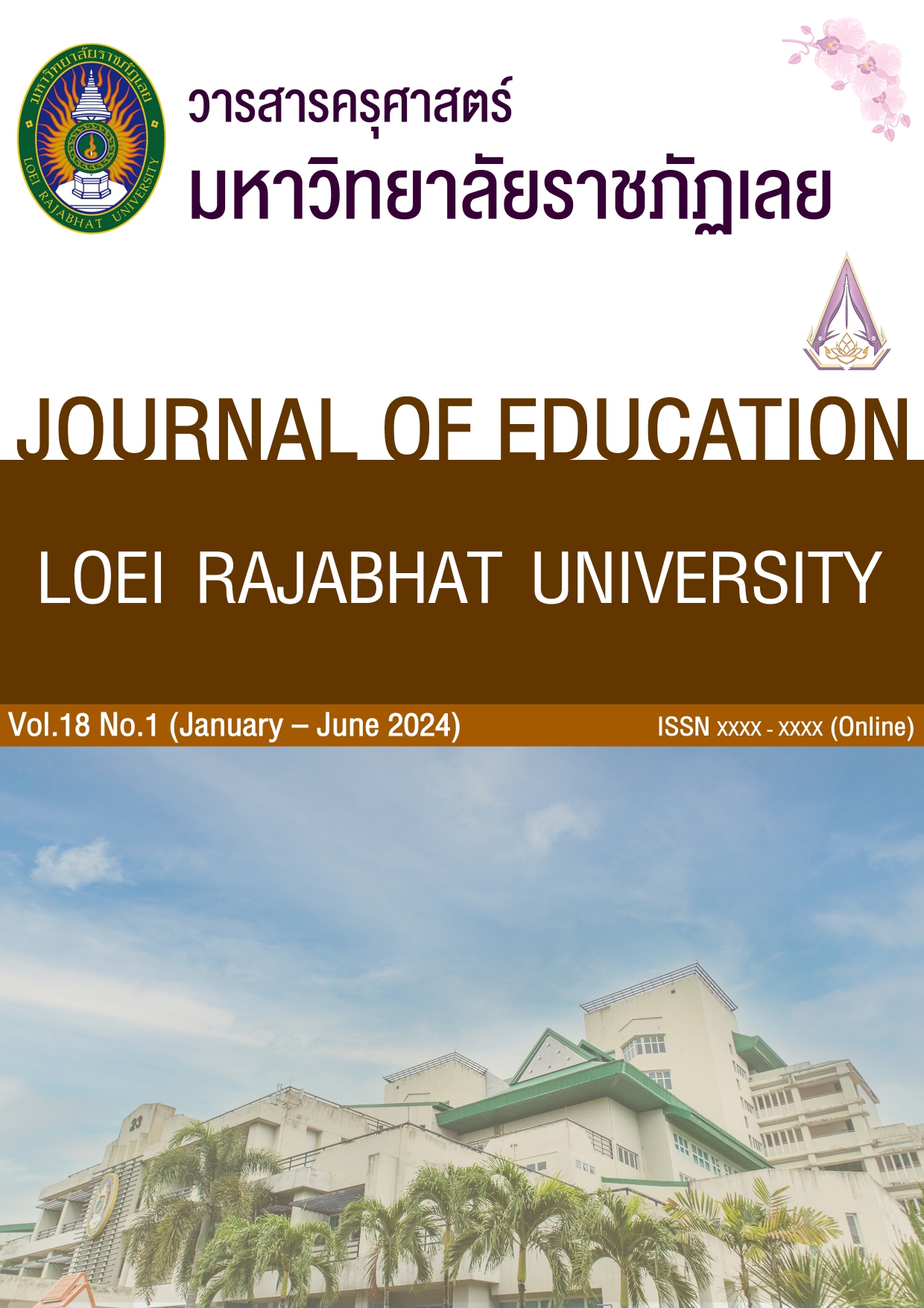การพัฒนาความสามารถด้านการเขียนรายงานผลการวิเคราะห์ข้อมูลเชิงคุณภาพ ของนักศึกษาครู มหาวิทยาลัยราชภัฏเลย โดยใช้กลยุทธ์การสะท้อนคิดและการจัดการเรียนรู้เชิงรุก
คำสำคัญ:
การใช้กลยุทธ์, การสะท้อนคิด, การจัดการเรียนรู้เชิงรุก, การเขียนรายงานผลการวิเคราะห์ข้อมูลคุณภาพบทคัดย่อ
การวิจัยครั้งนี้มีวัตถุประสงค์เพื่อ 1) เปรียบเทียบความสามารถด้านการเขียนรายงาน
ผลการวิเคราะห์ข้อมูลเชิงคุณภาพของนักศึกษาครูระหว่างก่อนเรียนกับหลังเรียนโดยใช้กลยุทธ์การสะท้อนคิดและการจัดการเรียนรู้เชิงรุก และ 2) เปรียบเทียบความสามารถด้านการเขียนรายงานผลการวิเคราะห์ข้อมูลเชิงคุณภาพของนักศึกษาครูระหว่างหลังเรียนโดยใช้กลยุทธ์การสะท้อนคิดและการจัดการเรียนรู้เชิงรุก
กับเกณฑ์คะแนนร้อยละ 60 ตัวอย่างที่ใช้ในการวิจัย คือ นักศึกษาชั้นปีที่ 3 คณะครุศาสตร์ จำนวน 27 คน โดยการสุ่มแบบแบ่งกลุ่ม เครื่องมือที่ใช้ในการวิจัย คือ แบบวัดความสามารถด้านการเขียนรายงานผล
การวิเคราะห์ข้อมูลเชิงคุณภาพ การวิเคราะห์ข้อมูล ได้แก่ ความถี่ ร้อยละ สถิติทีทดสอบความแตกต่างระหว่างค่าเฉลี่ยของประชากร 2 กลุ่มที่สัมพันธ์กัน และสถิติทีทดสอบความแตกต่างของค่าเฉลี่ยกับเกณฑ์ ผลการวิจัยพบว่า นักศึกษาครูหลังเรียนโดยใช้การสะท้อนคิดและการเรียนรู้เชิงรุกกลยุทธ์มีคะแนนความสามารถด้านการเขียนรายงานสูงกว่าก่อนเรียน และสูงกว่าเกณฑ์คะแนนร้อยละ 60 อย่างมีนัยสำคัญทางสถิติที่ระดับ .05
เอกสารอ้างอิง
ปวีณภัทร นิธิตันติวัฒน์, (2557). แนวการจัดการเรียนการสอนโดยใช้การสะท้อนคิด (Reflection).
วิทยาลัยพยาบาลบรมราชชนนี ราชบุรี.
ภัทราพร เกษสังข์. (2566). การวิจัยปฏิบัติการ, (พิมพ์ครั้งที่ 2). สำนักพิมพ์จุฬาลงกรณ์มหาวิทยาลัย.
Barrows, H. S., & Tamblyn, R. M. (1980). Problem-based learning: An approach
to medical education. New York, Springer Publishing Company.
Boud, D., Keogh, R., & Walker, D. (2013). Reflection: Turning experience into learning.
Routledge. From https://doi.org/10.4324/9781315059051
Branch Jr, W. T., & Paranjape, A. (2002). Feedback and reflection: teaching methods
for clinical settings. Academic Medicine, 77(12 Part 1), 1185-1188. From
https://doi.org/10.1080/2159676X.2019.1628806
Braun, V., & Clarke, V. (2019). Reflecting on reflexive thematic analysis. Qualitative
research in sport, exercise and health. 11(4), 589-597. From
https://doi.org/10.1080/2159676X.2019.1628806
Freeman, S., Eddy, S. L., McDonough, M., Smith, M. K., Okoroafor, N., Jordt, H., &
Wenderoth, M. P. (2014). Active learning increases student performance in
science, engineering, and mathematics. Proceedings of the National Academy
of Sciences, 111(23), 8410-84201915. From https://doi: 10.1073/pnas.1319030111.
Epub 2014 May 12. PMID: 24821756; PMCID: PMC4060654.
Haak, D. C., HilleRisLambers, J., Pitre, E., & Freeman, S. (2011). Increased structure and
active learning reduce the achievement gap in introductory biology.
Science, 332(6034), 1213-1216. From https://doi: 10.1126/science.1204820. PMID:
Heale, R., & Twycross, A. (2018). What is a case study?. Evidence-based nursing, 21(1),
-8. From http://dx.doi.org/10.1136/eb-2017-102845
Johnson, D. W., Johnson, R. T., & Smith, K. A. (2014). Cooperative learning: Improving
university instruction by basing practice on validated theory. Journal on
Excellence in University Teaching, 25(4), 1-26. From
https://CLImprovingUnInstruction2015copy.pdf
Kirschner, P. A., Sweller, J., & Clark, R. E. (2006). Why minimal guidance during instruction
does not work: An analysis of the failure of constructivist, discovery, problem-
based, experiential, and inquiry-based teaching. Educational Psychologist, 41(2),
-86. From https://doi.org/10.1207/s15326985ep4102_1
Mertler, C. A., & Charles, C. M. (2010). Introduction to educational research (7th ed.). Sage.
Mirzaei, F., Phang, F. A., & Kashefi, H. (2014). Measuring teachers reflective thinking
skills. Procedia-Social and Behavioral Sciences, 141, 640-647. From
https://doi.org/10.1016/j.sbspro.2014.05.112
Prince, M. J. (2004). Does active learning work? A review of the research. Journal of
engineering education, 93(3), 223-231. From
https://doi.org/10.1002/j.2168-9830.2004.tb00809
Prince, M. J., & Felder, R. D. (2007). The many faces of inductive teaching and
learning. Journal of College Science Teaching, 36(5), 14-20. From
https://www/Inductive(JCST).pdf (pfw.edu)
Schön, D. A. (1983). The reflective practitioner: How professionals think in action.
London, Routledge. From https://doi.org/10.4324/9781315237473
Tican, C., & Taşpinar, M. (2015). The Effects of Reflective Thinking-based Teaching
Activities on Pre-service Teachers' Reflective Thinking Skills, Critical Thinking Skills, Democratic Attitudes, and Academic Achievement. Anthropologist, 20, 111-120. https://doi.org/10.1080/09720073.2015.11891730
ดาวน์โหลด
เผยแพร่แล้ว
รูปแบบการอ้างอิง
ฉบับ
ประเภทบทความ
สัญญาอนุญาต

อนุญาตภายใต้เงื่อนไข Creative Commons Attribution-NonCommercial-NoDerivatives 4.0 International License.
เนื้อหาและข้อมูลในบทความที่ตีพิมพ์ในวารสารครุศาสตร์ มหาวิทยาลัยราชภัฏเลย ถือเป็นความคิดเห็นและความรับผิดชอบของผู้เขียนบทความโดยตรง กองบรรณาธิการวารสารไม่มีส่วนในความคิดเห็นและความรับผิดชอบใดที่เกี่ยวข้องกับบทความดังกล่าว ทั้งนี้ บทความที่ได้รับการตีพิมพ์ในวารสาร ฯ ถือเป็นลิขสิทธิ์ของวารสาร







